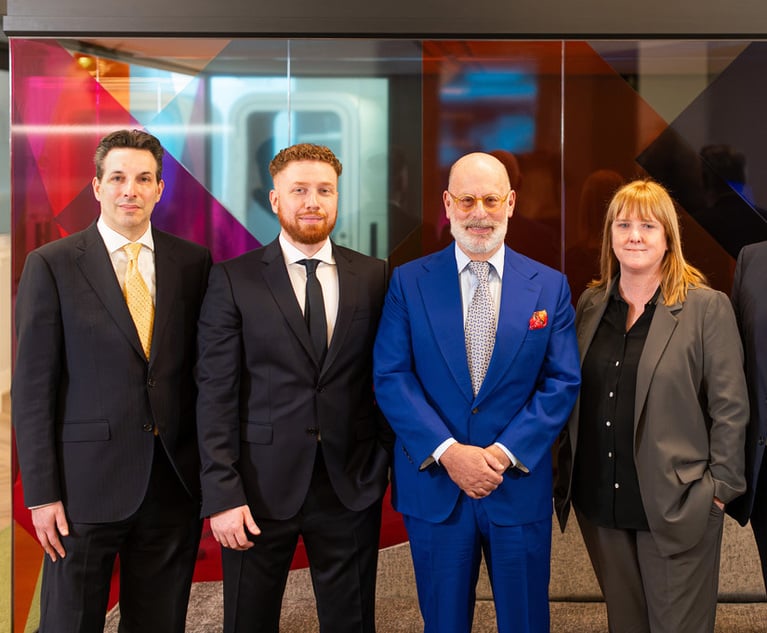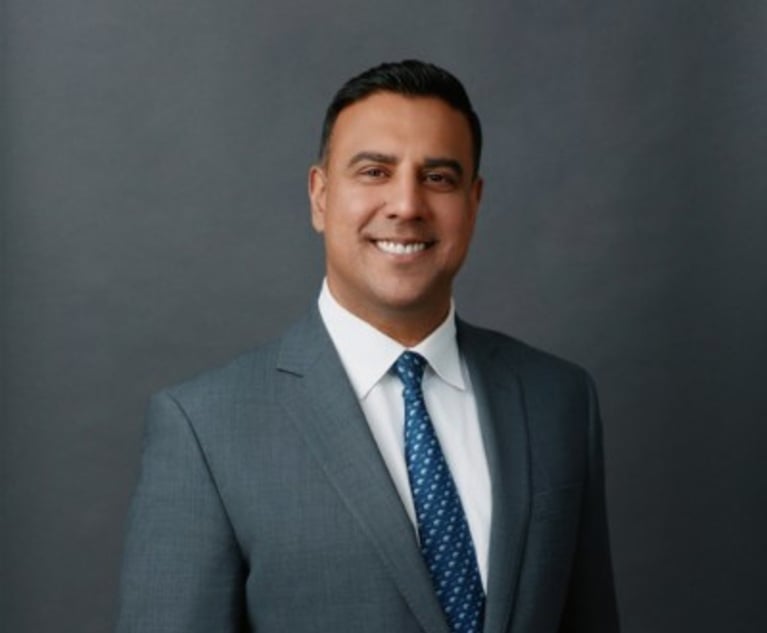Linklaters partners vote in Gideon Moore as managing partner
Moore was chosen for the position by a committee of partners earlier this month, subject to a firm wide partnership vote
November 17, 2015 at 06:55 AM
3 minute read
Linklaters banking head Gideon Moore's appointment as the firm's new managing partner has been ratified by the firm's partnership in an all partner-vote.
Moore was appointed by the firm's partnership board earlier this month but his position remained to be ratified by a partnership vote at the firms partner conference, currently underway.
In the vote today he received in excess of the 75% approval rating needed to endorse his appointment.
Moore will take over the managing partner role from Simon Davies in January for a four-year term.
Davies announced in July that he would step down a year early to join Lloyd's Banking Group as its chief people, legal and strategy officer.
Gideon is an outstanding lawyer with proven management and leadership qualities
His announcement triggered the managing partner election process that culminated today in Moore's endorsement by the partnership.
The firm's chairman and senior partner Robert Elliott said: "Gideon is an outstanding lawyer with proven management and leadership qualities. His election comes after a tremendously positive and collegiate process and marks the next phase in the firm's development, which I believe Gideon is ideally suited to lead."
 Moore (pictured) said he was "honoured to have the opportunity" to lead Linklaters.
Moore (pictured) said he was "honoured to have the opportunity" to lead Linklaters.
He added: "My job will focus on creating the best conditions for this firm to excel – delivering an outstanding client experience; investing to manage our matters ever more efficiently; ensuring that we are able to support our clients around the world with our uniform top level advice; and by making Linklaters an ever better place to work, where our people can perform to the best of their abilities and thrive in their careers."
In the summer the firm's partnership board drew up an initial list of six candidates: operational intelligence co-head Tom Shropshire, litigation head Michael Bennett, Asia managing partner Marc Harvey, head of finance and projects Michael Kent, Amsterdam-based European managing partner Pieter Riemer and Moore.
The list was reduced to three after the candidates presented their vision for the future of the firm to the partnership board.
The final three, Moore, Harvey and Bennett, then embarked on a hustings process within the partnership, in which they visited a number of the firm's international offices and held town hall meetings to expound on their vision for the firm and field questions from partners.
The partnership board, after consulting within the partnership, chose Moore as the winning candidate, contingent on the firm's partners ratifying the decision in an all-partner vote.
This content has been archived. It is available through our partners, LexisNexis® and Bloomberg Law.
To view this content, please continue to their sites.
Not a Lexis Subscriber?
Subscribe Now
Not a Bloomberg Law Subscriber?
Subscribe Now
NOT FOR REPRINT
© 2025 ALM Global, LLC, All Rights Reserved. Request academic re-use from www.copyright.com. All other uses, submit a request to [email protected]. For more information visit Asset & Logo Licensing.
You Might Like
View All
Rosenblatt Breaks Away From RBG, Becomes 40-Strong Standalone Firm

Eversheds Sutherland Outgoing Co-CEO to Move to Dubai to Spur Regional Growth
2 minute read
More than Half of South Australian Lawyers Report Suffering Harassment
3 minute readTrending Stories
- 1Uber Files RICO Suit Against Plaintiff-Side Firms Alleging Fraudulent Injury Claims
- 2The Law Firm Disrupted: Scrutinizing the Elephant More Than the Mouse
- 3Inherent Diminished Value Damages Unavailable to 3rd-Party Claimants, Court Says
- 4Pa. Defense Firm Sued by Client Over Ex-Eagles Player's $43.5M Med Mal Win
- 5Losses Mount at Morris Manning, but Departing Ex-Chair Stays Bullish About His Old Firm's Future
Who Got The Work
J. Brugh Lower of Gibbons has entered an appearance for industrial equipment supplier Devco Corporation in a pending trademark infringement lawsuit. The suit, accusing the defendant of selling knock-off Graco products, was filed Dec. 18 in New Jersey District Court by Rivkin Radler on behalf of Graco Inc. and Graco Minnesota. The case, assigned to U.S. District Judge Zahid N. Quraishi, is 3:24-cv-11294, Graco Inc. et al v. Devco Corporation.
Who Got The Work
Rebecca Maller-Stein and Kent A. Yalowitz of Arnold & Porter Kaye Scholer have entered their appearances for Hanaco Venture Capital and its executives, Lior Prosor and David Frankel, in a pending securities lawsuit. The action, filed on Dec. 24 in New York Southern District Court by Zell, Aron & Co. on behalf of Goldeneye Advisors, accuses the defendants of negligently and fraudulently managing the plaintiff's $1 million investment. The case, assigned to U.S. District Judge Vernon S. Broderick, is 1:24-cv-09918, Goldeneye Advisors, LLC v. Hanaco Venture Capital, Ltd. et al.
Who Got The Work
Attorneys from A&O Shearman has stepped in as defense counsel for Toronto-Dominion Bank and other defendants in a pending securities class action. The suit, filed Dec. 11 in New York Southern District Court by Bleichmar Fonti & Auld, accuses the defendants of concealing the bank's 'pervasive' deficiencies in regards to its compliance with the Bank Secrecy Act and the quality of its anti-money laundering controls. The case, assigned to U.S. District Judge Arun Subramanian, is 1:24-cv-09445, Gonzalez v. The Toronto-Dominion Bank et al.
Who Got The Work
Crown Castle International, a Pennsylvania company providing shared communications infrastructure, has turned to Luke D. Wolf of Gordon Rees Scully Mansukhani to fend off a pending breach-of-contract lawsuit. The court action, filed Nov. 25 in Michigan Eastern District Court by Hooper Hathaway PC on behalf of The Town Residences LLC, accuses Crown Castle of failing to transfer approximately $30,000 in utility payments from T-Mobile in breach of a roof-top lease and assignment agreement. The case, assigned to U.S. District Judge Susan K. Declercq, is 2:24-cv-13131, The Town Residences LLC v. T-Mobile US, Inc. et al.
Who Got The Work
Wilfred P. Coronato and Daniel M. Schwartz of McCarter & English have stepped in as defense counsel to Electrolux Home Products Inc. in a pending product liability lawsuit. The court action, filed Nov. 26 in New York Eastern District Court by Poulos Lopiccolo PC and Nagel Rice LLP on behalf of David Stern, alleges that the defendant's refrigerators’ drawers and shelving repeatedly break and fall apart within months after purchase. The case, assigned to U.S. District Judge Joan M. Azrack, is 2:24-cv-08204, Stern v. Electrolux Home Products, Inc.
Featured Firms
Law Offices of Gary Martin Hays & Associates, P.C.
(470) 294-1674
Law Offices of Mark E. Salomone
(857) 444-6468
Smith & Hassler
(713) 739-1250









